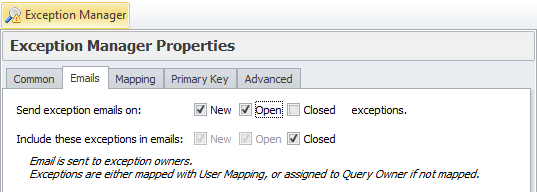Created by: Kristinn Magnusson
Exception emails alert either the exception owner or another specific user to pre-specified exceptions in your workflow, sent by exMon DG.
To enable exception emails you need to check one or more of the statuses:
- New – Sends email to the owner when new exceptions are found.
- Open – Sends email to the owner when test contains any open exception.
- Closed – Sends email to the owner when exceptions are closed/fixed.

What information does the email contain?
Specified exception notifications will be sent to you, the user, alerting you to important exceptions in your workflow. You can choose to include: new exceptions, all open exceptions, and exceptions that were closed in that execution.
In addition, you can also choose between email templates that are defined under General > Email Templates. By default, the template contains the test’s description and action as well as a list of all exceptions configured to be included in the email.
You also have an option where each exception in the exception email comes with a link to itself in the Portal, allowing for easy access to more details of the particular exception.
Who gets the exception emails?
The recipient of an exception email is by default the query owner of the test that produces the exception. However, you can change that with user mapping. User mapping allows you to select the mapping type and the column that should be mapped, electing to send exception emails to other specific users.
If the value in the mapped column matches an exMon user, that user will be the recipient of that exception, but if the value does not match an exMon user, the recipient will be the default, the test’s query owner.
Add CC email addresses
You can also add a CC to your exception email by two means, by simply writing the email address(es) that should receive a CC exception email. All exceptions made by the test will CC those email addresses. You can also add a CC mapping, similar to user mapping, where you select the mapping type and the column that should be mapped. If the value of the mapped column matches and exMon user, that user will be the CC of that exception. If there is no match for the column’s value, the CC is skipped.
Kristinn is the author of this solution article.